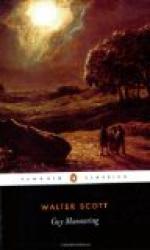We have observed, that in the latter part of his journey our traveller approached the sea-shore, without being aware how nearly. He now perceived that the ruins of Ellangowan Castle were situated upon a promontory, or projection of rock, which formed one side of a small and placid bay on the sea-shore. The modern mansion was placed lower, though closely adjoining, and the ground behind it descended to the sea by a small swelling green bank, divided into levels by natural terraces, on which grew some old trees, and terminating upon the white sand. The other side of the bay, opposite to the old castle, was a sloping and varied promontory, covered chiefly with copsewood, which on that favoured coast grows almost within water-mark. A fisherman’s cottage peeped from among the trees. Even at this dead hour of night there were lights moving upon the shore, probably occasioned by the unloading a smuggling lugger from the Isle of Man which was lying in the bay. On the light from the sashed door of the house being observed, a halloo from the vessel of ‘Ware hawk! Douse the glim!’ alarmed those who were on shore, and the lights instantly disappeared.
It was one hour after midnight, and the prospect around was lovely. The grey old towers of the ruin, partly entire, partly broken, here bearing the rusty weather-stains of ages, and there partially mantled with ivy, stretched along the verge of the dark rock which rose on Mannering’s right hand. In his front was the quiet bay, whose little waves, crisping and sparkling to the moonbeams, rolled successively along its surface, and dashed with a soft and murmuring ripple against the silvery beach. To the left the woods advanced far into the ocean, waving in the moonlight along ground of an undulating and varied form, and presenting those varieties of light and shade, and that interesting combination of glade and thicket, upon which the eye delights to rest, charmed with what it sees, yet curious to pierce still deeper into the intricacies of the woodland scenery. Above rolled the planets, each, by its own liquid orbit of light, distinguished from the inferior or more distant stars. So strangely can imagination deceive even those by whose volition it has been excited, that Mannering, while gazing upon these brilliant bodies, was half inclined to believe in the influence ascribed to them by superstition over human events. But Mannering was a youthful lover, and might perhaps be influenced by the feelings so exquisitely expressed by a modern poet:—
For fable is Love’s
world, his home, his birthplace:
Delightedly dwells he
’mong fays, and talismans,
And spirits, and delightedly
believes
Divinities, being himself
divine
The intelligible forms
of ancient poets,
The fair humanities
of old religion,
The power, the beauty,
and the majesty,
That had their haunts
in dale, or piny mountain,
Or forest, by slow stream,




